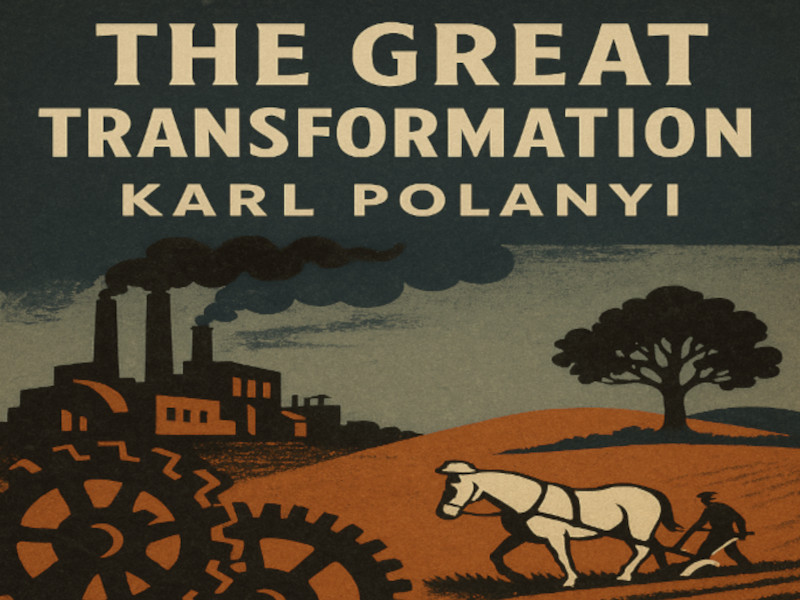Why Is ‘Socialism’ on the Rise? Karl Polanyi Had the Answer Nearly a Century Ago
Why It’s Not Socialism — But a Survival Response to Market Failure

Konstantin Kisin recently posed an important question on Substack: Why is socialism on the rise? He rightly points to growing despair among younger generations, priced out of home ownership and increasingly disillusioned with capitalism. But while the emotional diagnosis is sound, the structural explanation goes deeper than generational angst or economic illiteracy.
The real answer was outlined with chilling clarity in 1944 by Karl Polanyi in The Great Transformation. What we’re witnessing today is not a resurgence of socialism per se, but a natural reaction to the social devastation caused by what Polanyi called the “self-regulating market.”
To understand why today’s youth are embracing policies like rent freezes, debt forgiveness, or universal healthcare, we must start by recognizing that the so-called “free market” isn’t a naturally occurring phenomenon. It was engineered. And like all human inventions, it came with consequences—some of them catastrophic.
The Utopian Experiment
In Polanyi’s view, the 19th-century effort to create a self-regulating market was a radical, even utopian experiment. It attempted to subordinate land, labor, and money—none of which are actually commodities—to the logic of market pricing. But in doing so, it tore apart the social fabric. Communities were uprooted. Traditional bonds were severed. Institutions that once buffered people from the brutalities of economic life were dismantled in the name of “efficiency.”
Sound familiar?
Today’s young people are not clamoring for Marxist revolution. What they want is protection from an economic system that treats housing as an asset class, education as a debt trap, and healthcare as a privilege. They’re not anti-capitalist—they’re anti-predation.
Polanyi called this the “double movement.” On one side is the push for market liberalization—the removal of regulations, protections, and social obligations that hinder profit. On the other side is the inevitable pushback from society trying to shield itself from ruin. Every rent freeze, every minimum wage law, every welfare program is an expression of this second movement. And far from being “socialist” in the revolutionary sense, these measures are often conservative in the truest sense of the word: aimed at conserving human dignity, community stability, and social cohesion.
Rent Controls and the Moral Economy
Take rent control—one of the most vilified policies among free-market purists. Critics call it socialist, inefficient, and a distortion of supply and demand. But for Polanyi, rent control wasn’t an aberration; it was an example of what he called “protective countermeasures.” They emerge organically when markets overreach.
Housing, after all, is not just another good—it’s a basic human need. When the market treats it purely as a commodity, the results are predictable: homelessness, gentrification, social fragmentation. In the face of this, rent control isn’t about undermining capitalism; it’s about preventing capitalism from undermining society.
The Myth of the Free Market
Polanyi dismantled the myth that markets ever functioned independently of political and social structures. Every market is embedded in a moral and institutional framework. When that framework is stripped away—when deregulation becomes an ideology rather than a policy tool—markets begin to cannibalize the very society that sustains them.
This is what young people are reacting to. It’s not a lack of work ethic or education. It’s the lived experience of systemic failure. They are graduating into a world where wages stagnate while asset prices soar, where work is precarious and housing unaffordable, where mental health is collapsing under the weight of economic stress.
And when they turn to political leaders for answers, they are offered tax cuts for the wealthy, more deregulation, and lectures on personal responsibility. Is it any wonder that they are looking elsewhere?
Beyond Left and Right
To reduce this phenomenon to a simple revival of socialism is to miss the point. What we’re witnessing is a desperate search for balance. For decades, we were told that markets would self-correct, that growth would trickle down, and that deregulation would unleash innovation. Instead, we got monopolies, financial crises, and a generation drowning in anxiety.
Polanyi’s insight was that society will only tolerate this kind of dislocation for so long. Eventually, it pushes back—not because people are anti-market, but because they are pro-life in the broadest, most human sense.
This is the moment we’re in now. The answer is not to sneer at rent control or dismiss it as economic ignorance. The answer is to recognize it as part of a larger social immune response to market overreach. The real danger is not that young people are becoming socialists. The real danger is that, in the absence of meaningful reform, they may lose faith in democracy altogether.
A New Synthesis
The way forward is not to return to state socialism, nor to double down on market fundamentalism. We need a new synthesis—an economic model that puts people before profit, that re-embeds markets in social values, and that recognizes the limits of commodification.
This isn’t utopian. It’s necessary. And if we fail to heed Polanyi’s warning, the backlash won’t come in the form of policy debates or social media posts. It will come in the form of political instability, social breakdown, and the rise of true authoritarian alternatives.
The question isn’t why is socialism on the rise? The question is: how long can a society survive when its markets are allowed to run riot over its people?
Karl Polanyi answered that 80 years ago.
We should listen.


